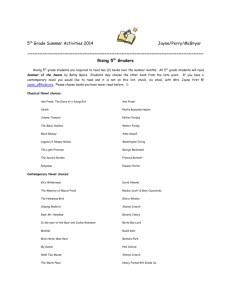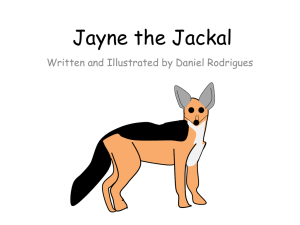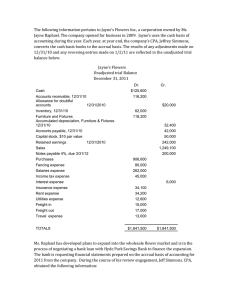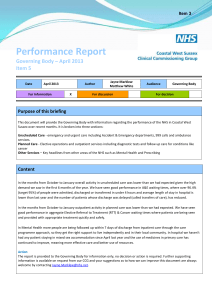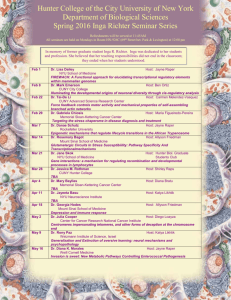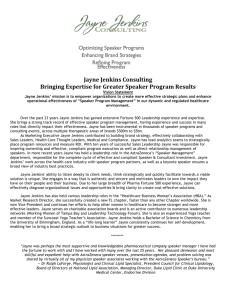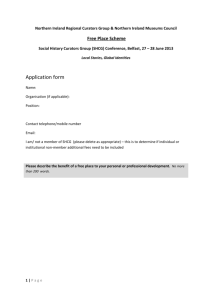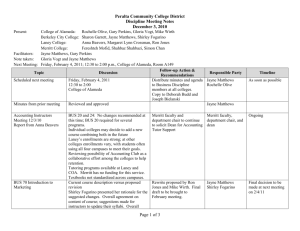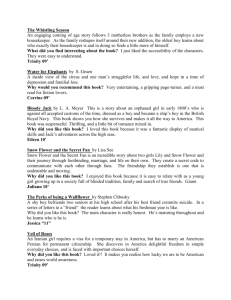Reflections on Quality in Early Years
advertisement
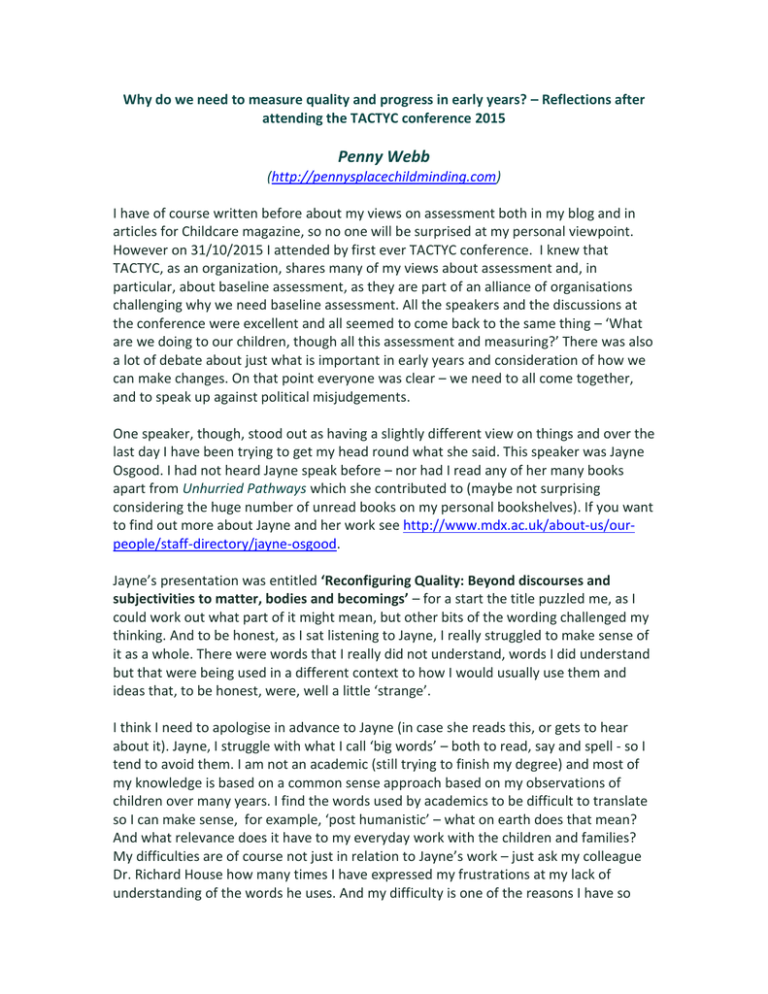
Why do we need to measure quality and progress in early years? – Reflections after attending the TACTYC conference 2015 Penny Webb (http://pennysplacechildminding.com) I have of course written before about my views on assessment both in my blog and in articles for Childcare magazine, so no one will be surprised at my personal viewpoint. However on 31/10/2015 I attended by first ever TACTYC conference. I knew that TACTYC, as an organization, shares many of my views about assessment and, in particular, about baseline assessment, as they are part of an alliance of organisations challenging why we need baseline assessment. All the speakers and the discussions at the conference were excellent and all seemed to come back to the same thing – ‘What are we doing to our children, though all this assessment and measuring?’ There was also a lot of debate about just what is important in early years and consideration of how we can make changes. On that point everyone was clear – we need to all come together, and to speak up against political misjudgements. One speaker, though, stood out as having a slightly different view on things and over the last day I have been trying to get my head round what she said. This speaker was Jayne Osgood. I had not heard Jayne speak before – nor had I read any of her many books apart from Unhurried Pathways which she contributed to (maybe not surprising considering the huge number of unread books on my personal bookshelves). If you want to find out more about Jayne and her work see http://www.mdx.ac.uk/about-us/ourpeople/staff-directory/jayne-osgood. Jayne’s presentation was entitled ‘Reconfiguring Quality: Beyond discourses and subjectivities to matter, bodies and becomings’ – for a start the title puzzled me, as I could work out what part of it might mean, but other bits of the wording challenged my thinking. And to be honest, as I sat listening to Jayne, I really struggled to make sense of it as a whole. There were words that I really did not understand, words I did understand but that were being used in a different context to how I would usually use them and ideas that, to be honest, were, well a little ‘strange’. I think I need to apologise in advance to Jayne (in case she reads this, or gets to hear about it). Jayne, I struggle with what I call ‘big words’ – both to read, say and spell - so I tend to avoid them. I am not an academic (still trying to finish my degree) and most of my knowledge is based on a common sense approach based on my observations of children over many years. I find the words used by academics to be difficult to translate so I can make sense, for example, ‘post humanistic’ – what on earth does that mean? And what relevance does it have to my everyday work with the children and families? My difficulties are of course not just in relation to Jayne’s work – just ask my colleague Dr. Richard House how many times I have expressed my frustrations at my lack of understanding of the words he uses. And my difficulty is one of the reasons I have so many unread books. The readers of my blog have told me they like the fact that I use everyday words and that I try to explain my understanding of documents and presentations I have heard at conferences. So with an advance apology to Jayne, and one to my readers (in case my understanding is not right) I am going to try and express in words what I thought Jayne’s presentation was about and how I think it links to my thoughts about assessment and measuring of young children. Deep breath – and here I go … My understanding is that Jayne was suggesting we need to look at quality in a totally different way and look beyond what we current think of as ‘quality’ and how we ‘measure it’. She was also suggesting that our current view is too limited, looking at the wrong things, and trying to measure to a scale when, in fact, the scale of things is so huge we simply cannot measure it. There was some disagreement in the room with some thinking that scales for measuring such as (but not restricted to) ECCERS, were a good thing and should still be used. Jayne said that she was not saying such things should not be used but that there was far more to it. On this point, I disagree with both those in the room and with Jayne’s response – in my view, things like ECCERS lead to box ticking, to people buying things or changing things with no understanding about what they are doing or how it impacts on the children in their care. What is right for one child or group of children, is not right for other children. I know that those who wrote such schemes did not think that they would be used so narrowly but they are. In my opinion ANYTHING that gives a score or a benchmark to work towards is dangerous and restricts reflective practice and, therefore, quality practice based on the needs of the children. It should not be about getting the highest score or copying the practice of others, or only doing the things that are on the ‘approved list’. Actually ,I think that is what Jayne was trying to say – quality cannot be defined: it will be different every time – even in the same building on different days or even in moments of the same day. Quality cannot be X, Y or Z: quality needs to be undefined and very flexible and other speakers at the conference had expressed it really well when relating things to real children and practitioners (or as seemed the preferred word at the conference ‘educators’). So, in a nut shell, Jayne’s to ‘look beyond’ (and all those other words that I did not understand or relate to) means quality is not having the right number of soft toys, or having junk modeling: it is about meeting the needs of each child, in whatever shape or format is right for that child: that an egg box can be more than an egg box and different to each child, not just in how it is used (with limitless possibilities within a child’s imagination) but what it represents in terms of where it came from, how it was made – and a million other possibilities. When all of this is put together and extended to include EVERYTHING then it is easy to see that the current view of how we define quality is well – useless, not fit for purpose. So we need to think again. If I have understood correctly, this is music to my ears and in line with this article/blog, I wrote fairly recently a blog about quality. Extending this to assessment it then makes perfect sense why trying to measure progress and even attainment is a complete waste of time using current methods. Does it matter what a child learns or when they learn it, or how fast they learn, or what they do with that piece of learning, what steps they take or in what direction? I am not saying that there is not a role for supportive adults, of course there is, but not in the way we support now trying to get children to all be the same in terms of outcomes. The important thing is that the children are learning and enjoying that learning. Maybe, if we stopped trying to measure learning and to record attainment, we would actually facilitate more free thinking and end up with more scientists, inventors, creative people, caring people …… And, most importantly, happy, self-fulfilled people who are not labelled failures at four years, or at any age, who go on to achieve their ‘best’ without anyone telling them their best is ‘not good enough’. And maybe we will stop having to pay out millions on schemes that do not improve anything, nor do they help individual children. Or on MPs who decide on important matters that they have no expertise in. Or on supporting those who have been failed by our education system and whose sense of self is so damaged they cannot self regulate, self motivate, develop relationships or, in fact, have what tongue in cheek could be called ‘quality of life’. So to conclude – provided I have grasped the main points of Jayne’s presentation, I agree with her. And if I haven’t grasped the main points, maybe Jayne or someone else at the conference (or who has read Jayne’s work,) would be so kind as to explain to me, in the comments box. Just please use everyday words!
